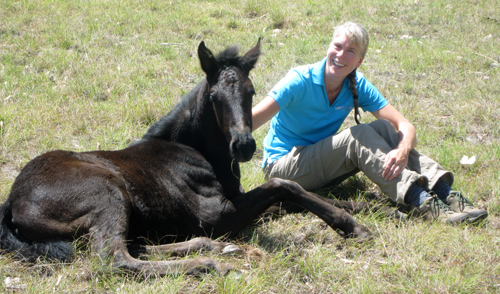By Alexandra Sawatzky, Students Promoting Awareness of Research Knowledge (SPARK)

In nature, a mare separates from its foal gradually, but in the equine industry, current methods of separation are often abrupt. This can have immediate and long-term negative repercussions for the mother and her offspring.
So why not try a kinder, gentler approach? That’s what Prof. Katrina Merkies, Department of Animal and Poultry Science at U of G’s Kemptville campus, is investigating. She’s studying how gradual weaning may reduce horses’ stress and optimize long-term health.
“Weaning is one of the most stressful points in a horse’s life,” she says. “Increased stress leads to depressed immune systems, which increases susceptibility to diseases and other health complications. Easing this stressful transition is an important dimension of equine welfare.”
Definitions of weaning vary. Researchers generally define it as the cessation of nursing. But in industry terms, it’s the physical separation of mare and foal. An improved understanding of how horses handle the transition may help reduce their anxiety and enhance their welfare.
Merkies’s research was inspired in part by the success of what’s called “two-stage” weaning in cattle, developed by Prof. Derek Haley, Department of Population Medicine. Essentially, this approach involves preventing nursing prior to separation, rather than both events occurring simultaneously, which mimics natural weaning more closely.
To find out if a similar approach would be effective in horses, Merkies began collecting preliminary data back in 2011, while working with master’s students Justine Danel and Kaitlyn Marshall. They found that indeed, noticeable differences occurred in equine behaviour when the two-stage approach was used.
To quantify these observations, Merkies subsequently recruited two more master’s students – Cordelie Dubois and Severine Parois – to develop a set of validated measurement parameters, which had not been previously established in the North American equine industry.
Under Merkies’s supervision, Dubois and Parois investigated novel, non-invasive methodologies for measuring responses to stressful stimuli – negating the need for direct, obtrusive observations.
For example, GPS tracking devices were used to study distances travelled by foals in response to weaning. Abrupt separation often causes foals to become frightened, and their immediate response is to run away – faster and farther than they normally would have done prior to this transition.
On average, foals travelled four times farther on the day of weaning. This, combined with increased speed, poses the risk of injury and exhaustion – indicating a potential welfare concern. Foals typically return to baseline mobility after a few days, but Merkies is trying to understand how to avoid this drastic increase in the first place.
Dubois also found fecal samples could be used to measure how cortisol levels fluctuate in response to stress. This offered a reliable, non-invasive alternative to using blood samples.
Finally, triaxial data loggers – monitoring devices that wrap around the animal’s leg – were used to collect information on standing and lying behaviour in horses, helping to explain how stress can lead to deviations from normal activities.
Validation of these parameters has given Merkies the resources to study the effects of novel approaches to weaning, providing a solid foundation for further research.
“The knowledge gained through studying equine stress responses can be adapted to fit different situations in the industry, generating the capacity to develop more creative solutions,” says Merkies.
This research was funded in part by the Ontario Ministry of Agriculture, Food and Rural Affairs.